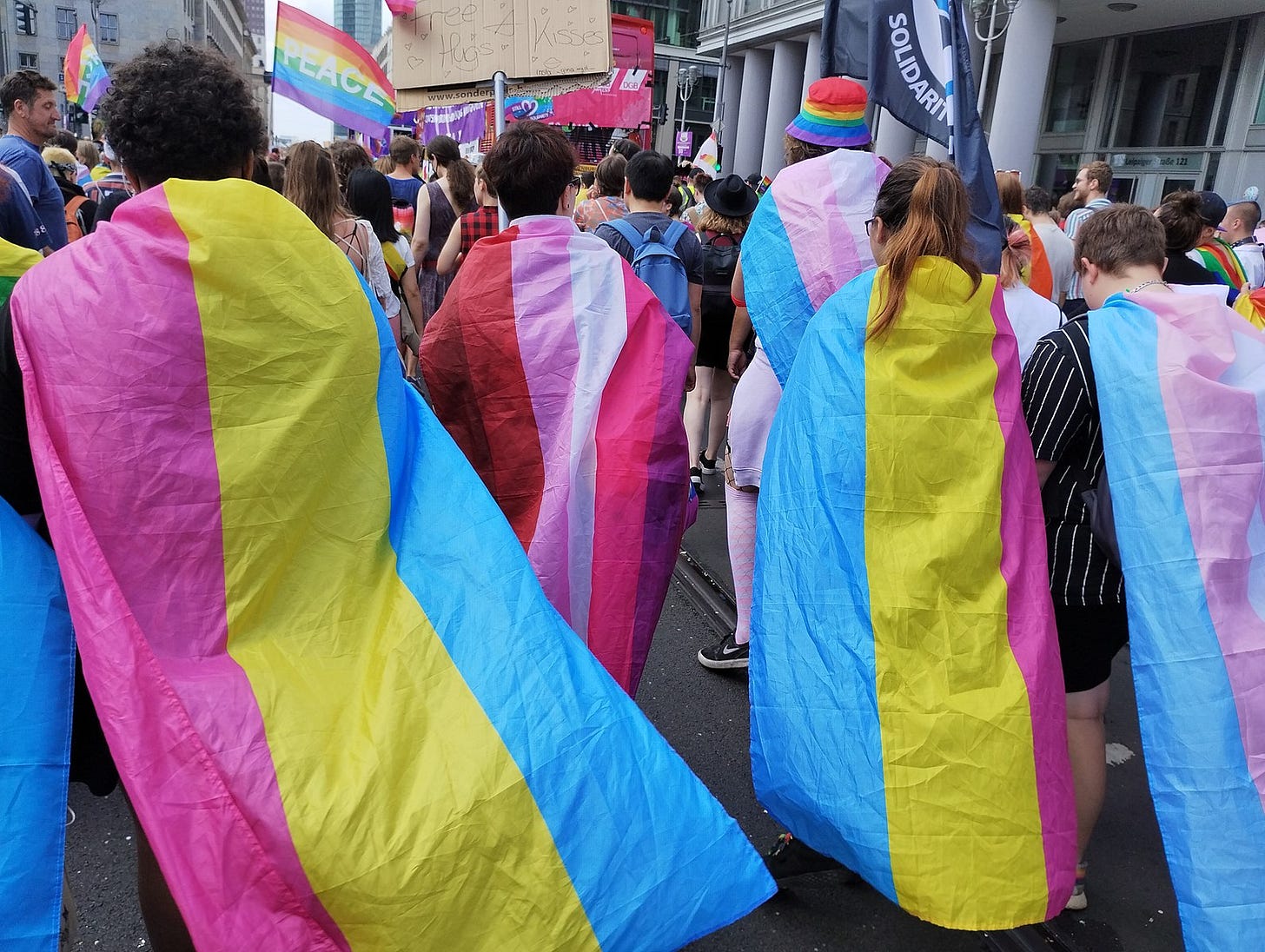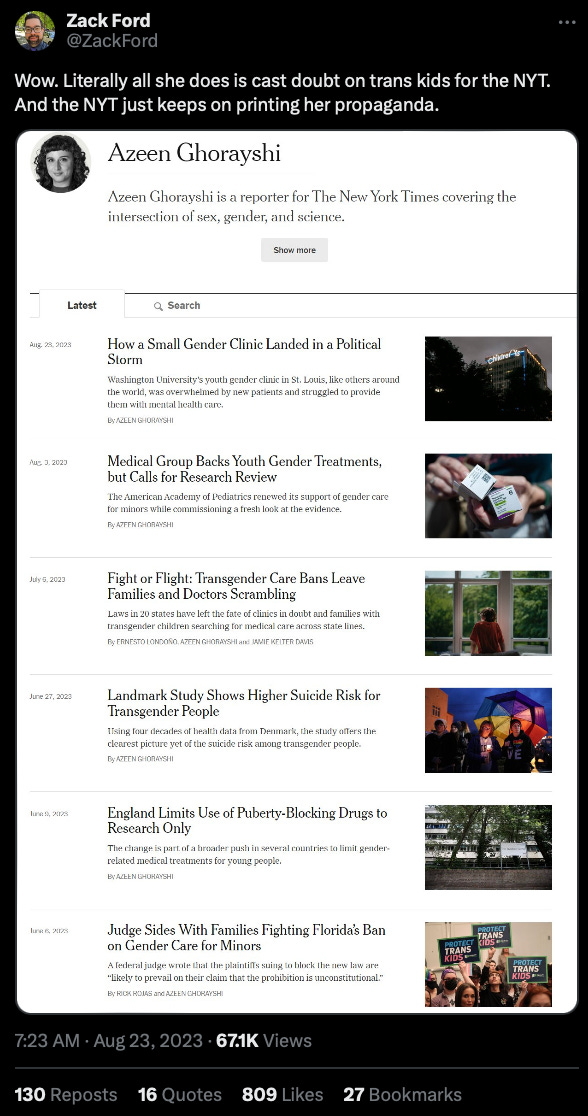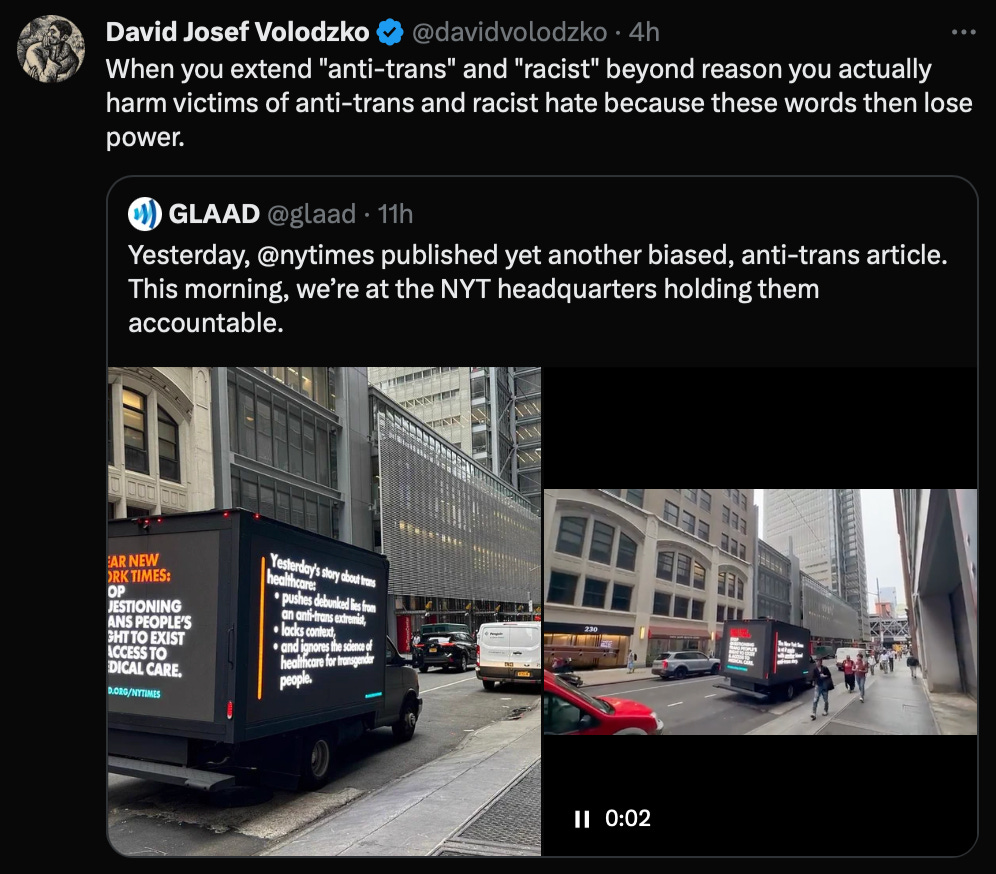Apples of Sodom
Did the New York Times publish anti-trans propaganda?
The most clamant concerns in American life include China, Russia, the economy and the culture. Each contains its own wars, and in the culture wars, the theater has shifted from the streets of racial justice to the labs of trans identity.
The transgender rights movement is a distillation of all that makes the culture wars so bitterly frustrating. The needless arguments over facts, the bad-faith accusations, the absurd hyperbole on both sides, the endless loop of unchanging talking points, and the human lives caught in the crossfire.
This week, The New York Times published an article by Azeen Ghorayshi titled “How a Small Gender Clinic Landed in a Political Storm,” which tells the story of Washington University’s youth gender clinic in St. Louis. GLAAD, the media-monitoring NGO originally named the Gay & Lesbian Alliance Against Defamation, posted on X:
This is not the first time GLAAD has targeted a journalist over perceived anti-queer rhetoric, but just as worrying is that the tactic is being applied, as George Orwell once wrote, as if “any pretense was always unnecessary,” because Ghorayshi did not write a “biased, anti-trans article.”
This is but one prominent example of the intense backlash that has formed against the article in the last two days. I have been on the receiving end of such unthinking hatred and Orwell still offers the best description of these pile-ons.
A hideous ecstasy of fear and vindictiveness, a desire to kill, to torture, to smash faces in with a sledge-hammer, seemed to flow through the whole group of people like an electric current, turning one even against one’s will into a grimacing, screaming lunatic. And yet the rage that one felt was an abstract, undirected emotion which could be switched from one object to another like the flame of a blowlamp.
Rather than post examples, let me share another from a prominent account where the person makes their point without vitriol but still veers into extremist rhetoric.
Zack Ford is the senior manager of press and editorial communications at Alliance for Justice (AFJ), an advocacy group that monitors federal judicial appointments in the United States. Members include the Children’s Defense Fund, Earthjustice, Human Rights Campaign, Planned Parenthood, Sierra Club and Southern Poverty Law Center.
Ford is a former journalist who covered the Trump administration for ThinkProgress. According to his AFJ profile, he “helps craft the voice of the organization.” We should therefore carefully consider the argument he is making rather than unfairly dismiss him, which is what I think he is doing to Ghorayshi, who begins her article as follows.
Last year, dozens of young patients were seeking appointments every month, far too many for the clinic’s two psychologists to screen. Doctors in the emergency room downstairs raised alarms about transgender teenagers arriving every day in crisis, taking hormones but not getting therapy.
Nothing that is “anti-trans” or “propaganda” would describe doctors who “raised alarms” and teens “in crisis” because this rhetoric references the authority of medical professionals and frames trans teens as suffering human beings. Anti-trans propaganda would talk about doctors who oppose so-called alarmism and would paint the teens as following a social trend rather than being in genuine crisis. Ghorayshi adds:
The prestigious clinic was welcomed by many families as a godsend. It was the only place for hundreds of miles where distressed adolescents could see a team of experts to help them transition to a different gender.
Calling it a “godsend” and the “only place for hundreds of miles” offering help makes the clinic sound like a blessed oasis in a heartless desert, while describing patients as “distressed adolescents” again reminds us that these are young people in suffering. Even if you are transphobic, you should still feel a stir in your heart for a child in pain.
Ghorayshi then describes how the number of patients became overwhelming for the clinic, and how a former case manager named Jamie Reed became a whistle-blower, claiming doctors at the clinic had prescribed hormones with lasting effects to adolescents who had serious psychiatric issues. Missouri then passed a series of bans on gender treatments for minors, Ghorayshi notes, but a Washington University investigation determined Reed’s claims were “unsubstantiated.”
The reality was more complex than what was portrayed by either side of the political battle […] Some of Ms. Reed’s claims could not be confirmed, and at least one included factual inaccuracies. But others were corroborated.
This kind of balance does not belong within 100 miles of a propaganda piece, yet even more incredible is the following passage.
Many patients and parents told The New York Times that the St. Louis team provided essential care, helping adolescents feel comfortable in their bodies for the first time. Some patients said they were lifted out of grave depression.
Ghorayshi is conducting a choir of patients and parents in singing the praises of the clinic. She later writes that as demand rose, the clinic began to receive more patients who had mental health issues, and she explains that the clinic’s staff did their very best to understand this issue, making them appear thoughtful and fair, but noting that they eventually relied on less qualified external therapists to help carry the load, and that this may have led to some approvals for puberty blockers that were not warranted.
But even here she is uncompromisingly fair, adding that “unwanted outcomes and regrets happen in every branch of medicine” and describing bans or severe restrictions on gender treatment for minors as “draconian.” She also points out that not one of the clinic’s 598 patients on hormonal medications reported physical problems. And she reminds us, yet again, that “transgender children have high rates of anxiety, depression and suicide attempts” and that Dutch doctors have found that adolescents who do not have severe psychiatric disorders and who have early-onset gender dysphoria do in fact see their depression lessen after taking puberty blockers. Lives are saved.
Ghorayshi even quotes multiple positive testimonials from therapists and people who transitioned including one trans man who says, quite touchingly, “I have normal-people problems, which is all that I ever wanted.” She then mentions a few individuals who later detransitioned, but none of these stories are horrific or extreme, as you would imagine them to be if this was anti-trans propaganda. One person simply says, “overall, there was a major lack of care and consideration for me.”
It is impossible to look at such remarks in any way but as a defense of gender treatment for minors, in particular the Dutch model. But, she explains, later clinics departed from the strict Dutch protocols in favor of the affirming model, which instead focuses on a child’s inner sense of themselves. If they say they are trans, then they are.
And remember, Ford also shared a screenshot of Ghorayshi’s recent articles, claiming “literally all she does is cast doubt on trans kids,” even though half the articles in the screenshot, not even including her latest, are positive. And, as I noted on X, let’s also forget the fact that it is an insult to the many other voices she has helped uplift to say this is “literally all she does.”
But of course, I do understand why people accuse Ghorayshi of transphobia even if I do not believe it’s true. Trans individuals go through a lot to obtain access to the kind of care that will improve their lives, and in some cases save them.
They naturally feel a sense of urgency and the mere suggestion that we must pause and think through these issues can be enraging when they quite fairly interpret that as people saying that things are going too fast when they think things are going far too slow—as lives literally hang in the balance. This sets up the board in such a way that they see thoughtful consideration and questioning as a direct attack on their very lives.
Moreover, there is the suggestion that some of these individuals may have psychological disorders that merit consideration before proceeding, and while this is true with regard to any medical procedure, in this case it also gives way to the anti-trans notion that maybe people who identify as trans are delusional. Nevertheless, none of this suggests that the affirming model is the correct one, and sadly, it is the trans community that ends up most hurt by this kind of rhetoric.
As the French priest Ernest Dimness said in his famous 1928 book The Art of Thinking, “Most people suspend their judgment till somebody else has expressed his own and then they repeat it.”
In that same book he wrote, “Every day you waste a chance, many chances in fact, of getting at your innermost consciousness by expressing yourself as you see yourself, and I say it is a pity because it makes you, year after year and day after day more like anybody else and more anonymous.”
Part of the project of finding ourselves, and finding our voice, lies in finding the voices of others. This is why great writers are firstly great readers. In our age of online public discourse, it is so easy to dismiss and become another mimicking, anonymous person. But it also so easy to go the other way. Often it only requires careful reading.
If we cannot do this then no matter how strongly we feel about an issue, all the polished apples of our arguments become like the bitter apples of Sodom, which hang from the tree that grew where the city once stood and whose fruit turn to ash once plucked from the branch.







That truck had made an earlier appearance in February of 2023. I sense it has lost much of its immediacy.
Organizations like GLAAD are making a mistake in trying to shut down debate over the fact that this is by far not settled science, as if there is ever such a thing. I think people need to start forthrightly acknowledging the events in Europe.